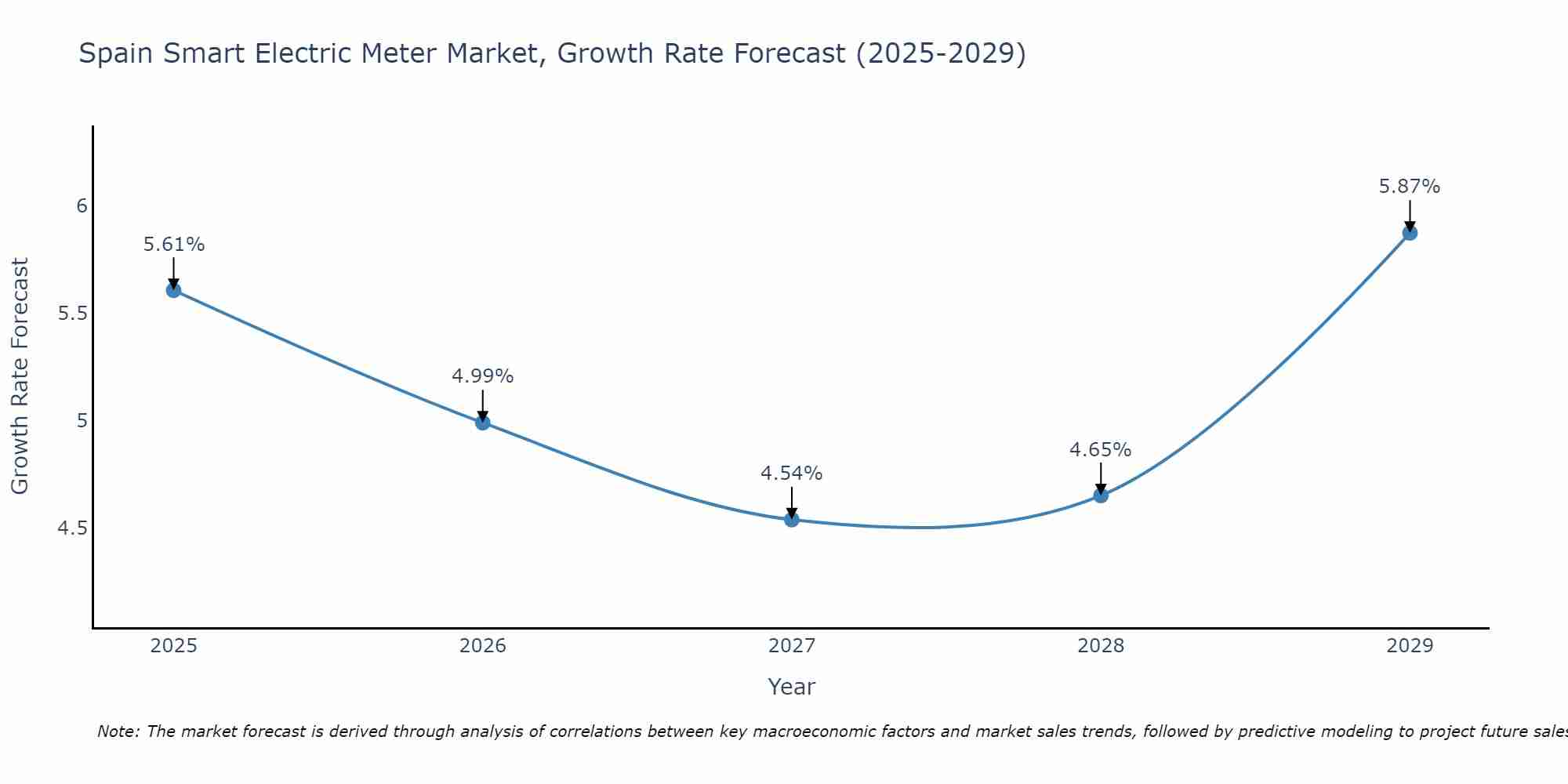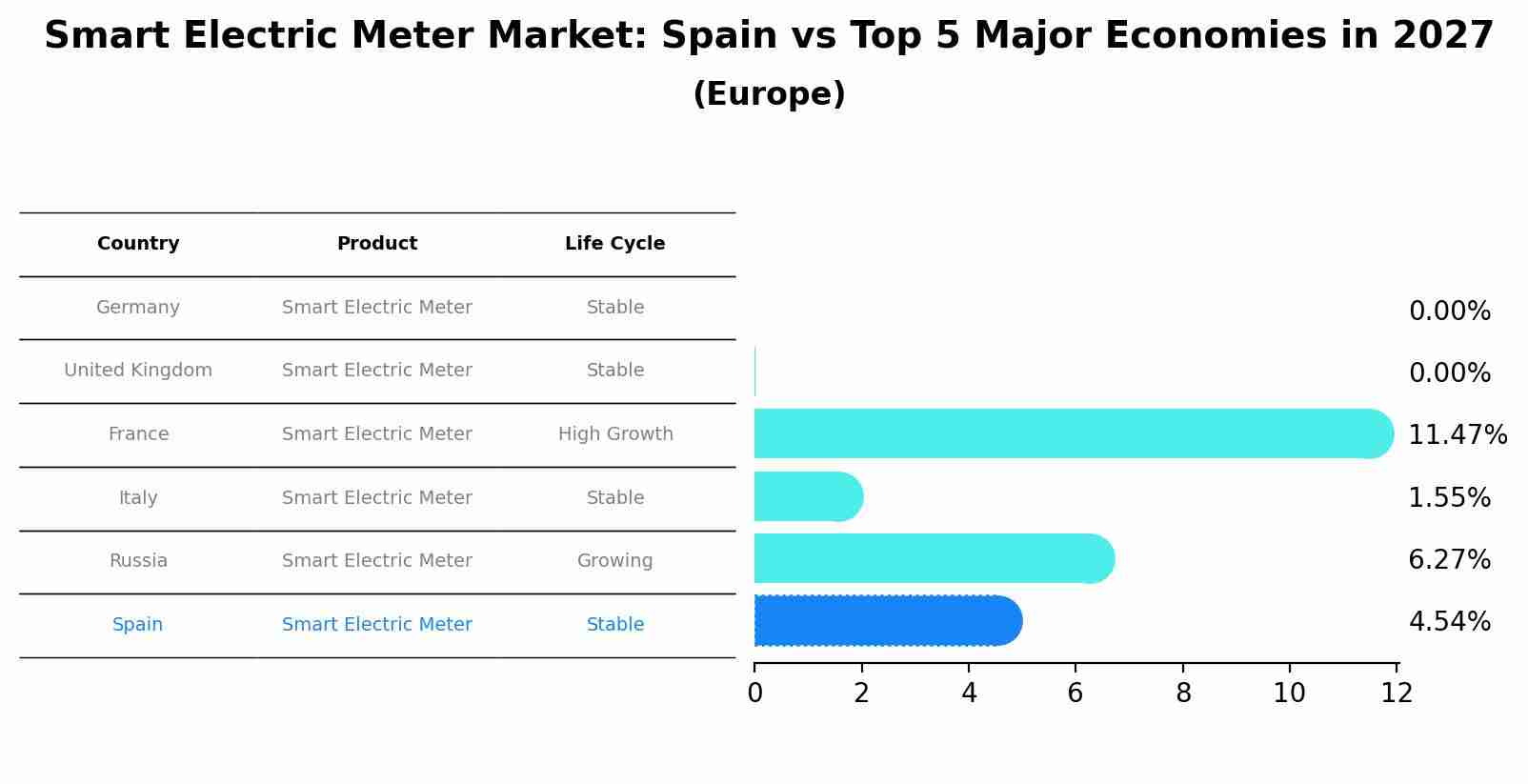Spain Smart Electric Meter Market Outlook | Share, Value, Size, Companies, Trends, Revenue, Forecast, COVID-19 IMPACT, Analysis, Growth & Industry
| Product Code: ETC369314 | Publication Date: Aug 2022 | Updated Date: Jul 2025 | Product Type: Market Research Report | |
| Publisher: 6Wresearch | Author: Sumit Sagar | No. of Pages: 75 | No. of Figures: 35 | No. of Tables: 20 |
Spain Smart Electric Meter Market Size Growth Rate
The Spain Smart Electric Meter Market is projected to witness mixed growth rate patterns during 2025 to 2029. From 5.61% in 2025, the growth rate steadily ascends to 5.87% in 2029.

Smart Electric Meter Market: Spain vs Top 5 Major Economies in 2027 (Europe)
By 2027, the Smart Electric Meter market in Spain is anticipated to reach a growth rate of 4.54%, as part of an increasingly competitive Europe region, where Germany remains at the forefront, supported by United Kingdom, France, Italy and Russia, driving innovations and market adoption across sectors.

Spain Smart Electric Meter Market Synopsis
The Spain Smart Electric Meter Market is experiencing significant growth driven by government initiatives promoting smart grid infrastructure and energy efficiency. Smart meter deployment is accelerating as utilities aim to modernize the grid and enable remote monitoring and management of energy consumption. The market is characterized by key players such as Iberdrola, Endesa, and Gas Natural Fenosa, who are investing in advanced metering infrastructure (AMI) solutions. Factors like increasing renewable energy integration, rising electricity prices, and the need for greater grid reliability are further fueling market growth. With regulatory support and a focus on enhancing energy management capabilities, the Spain Smart Electric Meter Market is expected to continue expanding, offering opportunities for technology advancements and innovative solutions in the coming years.
Spain Smart Electric Meter Market Trends
The Spain Smart Electric Meter Market is experiencing significant growth driven by increasing government initiatives for energy efficiency and the growing adoption of smart grid technologies. Key trends include a shift towards advanced metering infrastructure (AMI) solutions to enable real-time monitoring and control of electricity usage, integration of smart meters with renewable energy sources for better grid management, and the rise of demand response programs to optimize energy consumption. Additionally, the market is witnessing a transition towards smart meters with enhanced communication capabilities such as IoT connectivity and data analytics for improved operational efficiency. Overall, the Spain Smart Electric Meter Market is poised for continued expansion as utilities and consumers alike prioritize energy conservation and sustainability.
Spain Smart Electric Meter Market Challenges
In the Spain Smart Electric Meter Market, several challenges are faced including regulatory complexities, interoperability issues, data privacy concerns, and financial constraints. The regulatory landscape in Spain can be complex and fragmented, leading to delays in the implementation of smart metering initiatives. Interoperability issues arise when different smart metering systems from various vendors do not communicate effectively with each other, hindering seamless operations. Data privacy concerns also present a challenge, as the collection and processing of sensitive consumer data must comply with strict regulations. Additionally, financial constraints can limit the widespread adoption of smart meters, as the initial investment costs may be prohibitive for some utilities and consumers. Overcoming these challenges will be crucial for the successful deployment and integration of smart electric meters in Spain.
Spain Smart Electric Meter Market Investment Opportunities
The Spain Smart Electric Meter Market presents promising investment opportunities due to the increasing government initiatives towards energy efficiency and smart grid infrastructure development. With a growing focus on renewable energy integration and the need for more accurate metering systems, the demand for smart electric meters is expected to rise significantly. Investors can consider opportunities in smart meter manufacturing companies, software providers for meter data management and analytics, as well as service providers for smart meter installation and maintenance. Additionally, partnerships with utilities for large-scale smart meter deployment projects can be lucrative. As Spain aims to modernize its electricity grid and improve energy management, investing in the smart electric meter market can offer long-term growth potential and a chance to contribute to the country`s sustainability goals.
Jordan Agar Market Government Policies
In Spain, government policies have been instrumental in driving the adoption of smart electric meters. The government introduced regulations requiring the installation of smart meters in all households and small businesses by 2018 to promote energy efficiency and enable better management of electricity consumption. Additionally, the Spanish government has implemented measures to incentivize the deployment of smart meters by offering subsidies and funding programs to support utilities and consumers in upgrading to smart metering systems. These policies aim to modernize the country`s electricity grid, reduce energy consumption, and promote sustainability. Overall, the government`s focus on smart metering technologies has been crucial in shaping the Spain Smart Electric Meter Market and accelerating the transition towards a more efficient and sustainable energy infrastructure.
Spain Smart Electric Meter Market Future Outlook
The Spain Smart Electric Meter Market is poised for significant growth in the coming years as the country aims to modernize its energy infrastructure and promote energy efficiency. Factors such as increasing government initiatives towards smart grid development, rising adoption of renewable energy sources, and the need for accurate real-time energy consumption data are driving the demand for smart electric meters in Spain. Additionally, the growing focus on reducing carbon emissions and achieving sustainability goals will further boost market growth. With advancements in technology and the increasing awareness among consumers about the benefits of smart meters, the Spain Smart Electric Meter Market is expected to expand rapidly, offering opportunities for key market players to innovate and capture a larger market share.
Key Highlights of the Report:
- Spain Smart Electric Meter Market Outlook
- Market Size of Spain Smart Electric Meter Market, 2021
- Forecast of Spain Smart Electric Meter Market, 2031
- Historical Data and Forecast of Spain Smart Electric Meter Revenues & Volume for the Period 2018 - 2031
- Spain Smart Electric Meter Market Trend Evolution
- Spain Smart Electric Meter Market Drivers and Challenges
- Spain Smart Electric Meter Price Trends
- Spain Smart Electric Meter Porter's Five Forces
- Spain Smart Electric Meter Industry Life Cycle
- Historical Data and Forecast of Spain Smart Electric Meter Market Revenues & Volume By Phase for the Period 2018 - 2031
- Historical Data and Forecast of Spain Smart Electric Meter Market Revenues & Volume By Single for the Period 2018 - 2031
- Historical Data and Forecast of Spain Smart Electric Meter Market Revenues & Volume By Three for the Period 2018 - 2031
- Historical Data and Forecast of Spain Smart Electric Meter Market Revenues & Volume By Communication Technology Type for the Period 2018 - 2031
- Historical Data and Forecast of Spain Smart Electric Meter Market Revenues & Volume By Power Line Communication (PLC) for the Period 2018 - 2031
- Historical Data and Forecast of Spain Smart Electric Meter Market Revenues & Volume By Radio Frequency (RF) for the Period 2018 - 2031
- Historical Data and Forecast of Spain Smart Electric Meter Market Revenues & Volume By Cellular for the Period 2018 - 2031
- Historical Data and Forecast of Spain Smart Electric Meter Market Revenues & Volume By End-Users for the Period 2018 - 2031
- Historical Data and Forecast of Spain Smart Electric Meter Market Revenues & Volume By Industrial for the Period 2018 - 2031
- Historical Data and Forecast of Spain Smart Electric Meter Market Revenues & Volume By Commercial for the Period 2018 - 2031
- Historical Data and Forecast of Spain Smart Electric Meter Market Revenues & Volume By Residential for the Period 2018 - 2031
- Spain Smart Electric Meter Import Export Trade Statistics
- Market Opportunity Assessment By Phase
- Market Opportunity Assessment By Communication Technology Type
- Market Opportunity Assessment By End-Users
- Spain Smart Electric Meter Top Companies Market Share
- Spain Smart Electric Meter Competitive Benchmarking By Technical and Operational Parameters
- Spain Smart Electric Meter Company Profiles
- Spain Smart Electric Meter Key Strategic Recommendations
Frequently Asked Questions About the Market Study (FAQs):
- Single User License$ 1,995
- Department License$ 2,400
- Site License$ 3,120
- Global License$ 3,795
Search
Related Reports
- ASEAN Bearings Market (2025-2031) | Strategy, Consumer Insights, Analysis, Investment Trends, Opportunities, Growth, Size, Share, Industry, Revenue, Segments, Value, Segmentation, Supply, Forecast, Restraints, Outlook, Competition, Drivers, Trends, Demand, Pricing Analysis, Competitive, Strategic Insights, Companies, Challenges
- Europe Flooring Market (2025-2031) | Outlook, Share, Industry, Trends, Forecast, Companies, Revenue, Size, Analysis, Growth & Value
- Saudi Arabia Manlift Market (2025-2031) | Outlook, Size, Growth, Trends, Companies, Industry, Revenue, Value, Share, Forecast & Analysis
- Uganda Excavator, Crane, and Wheel Loaders Market (2025-2031) | Strategy, Consumer Insights, Analysis, Investment Trends, Opportunities, Growth, Size, Share, Industry, Revenue, Segments, Value, Segmentation, Supply, Forecast, Restraints, Outlook, Competition, Drivers, Trends, Demand, Pricing Analysis, Competitive, Strategic Insights, Companies, Challenges
- Rwanda Excavator, Crane, and Wheel Loaders Market (2025-2031) | Strategy, Consumer Insights, Analysis, Investment Trends, Opportunities, Growth, Size, Share, Industry, Revenue, Segments, Value, Segmentation, Supply, Forecast, Restraints, Outlook, Competition, Drivers, Trends, Demand, Pricing Analysis, Competitive, Strategic Insights, Companies, Challenges
- Kenya Excavator, Crane, and Wheel Loaders Market (2025-2031) | Strategy, Consumer Insights, Analysis, Investment Trends, Opportunities, Growth, Size, Share, Industry, Revenue, Segments, Value, Segmentation, Supply, Forecast, Restraints, Outlook, Competition, Drivers, Trends, Demand, Pricing Analysis, Competitive, Strategic Insights, Companies, Challenges
- Angola Excavator, Crane, and Wheel Loaders Market (2025-2031) | Strategy, Consumer Insights, Analysis, Investment Trends, Opportunities, Growth, Size, Share, Industry, Revenue, Segments, Value, Segmentation, Supply, Forecast, Restraints, Outlook, Competition, Drivers, Trends, Demand, Pricing Analysis, Competitive, Strategic Insights, Companies, Challenges
- Israel Intelligent Transport System Market (2025-2031) | Strategy, Consumer Insights, Analysis, Investment Trends, Opportunities, Growth, Size, Share, Industry, Revenue, Segments, Value, Segmentation, Supply, Forecast, Restraints, Outlook, Competition, Drivers, Trends, Demand, Pricing Analysis, Competitive, Strategic Insights, Companies, Challenges
- Uganda Precast and Aggregate Market (2025-2031) | Strategy, Consumer Insights, Analysis, Investment Trends, Opportunities, Growth, Size, Share, Industry, Revenue, Segments, Value, Segmentation, Supply, Forecast, Restraints, Outlook, Competition, Drivers, Trends, Demand, Pricing Analysis, Competitive, Strategic Insights, Companies, Challenges
- Australia IT Asset Disposal Market (2025-2031) | Strategy, Consumer Insights, Analysis, Investment Trends, Opportunities, Growth, Size, Share, Industry, Revenue, Segments, Value, Segmentation, Supply, Forecast, Restraints, Outlook, Competition, Drivers, Trends, Demand, Pricing Analysis, Competitive, Strategic Insights, Companies, Challenges
Industry Events and Analyst Meet
Our Clients
Whitepaper
- Middle East & Africa Commercial Security Market Click here to view more.
- Middle East & Africa Fire Safety Systems & Equipment Market Click here to view more.
- GCC Drone Market Click here to view more.
- Middle East Lighting Fixture Market Click here to view more.
- GCC Physical & Perimeter Security Market Click here to view more.
6WResearch In News
- Doha a strategic location for EV manufacturing hub: IPA Qatar
- Demand for luxury TVs surging in the GCC, says Samsung
- Empowering Growth: The Thriving Journey of Bangladesh’s Cable Industry
- Demand for luxury TVs surging in the GCC, says Samsung
- Video call with a traditional healer? Once unthinkable, it’s now common in South Africa
- Intelligent Buildings To Smooth GCC’s Path To Net Zero













